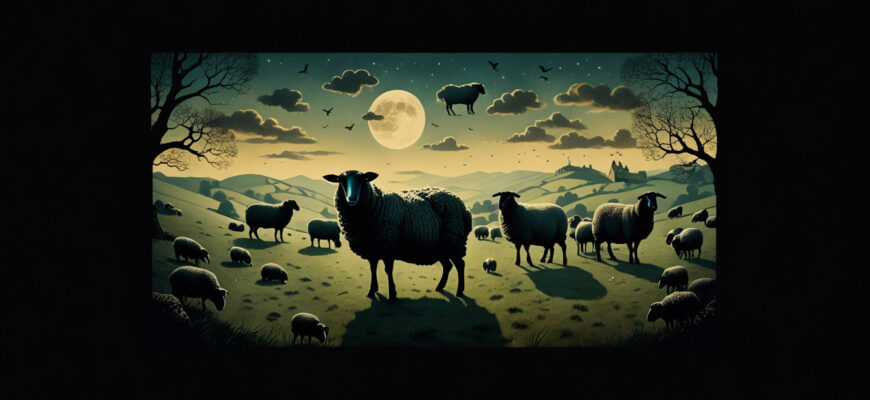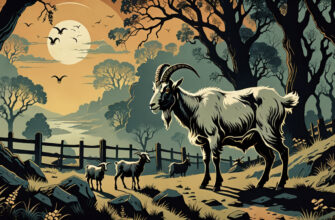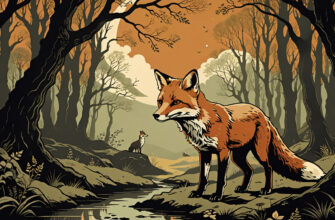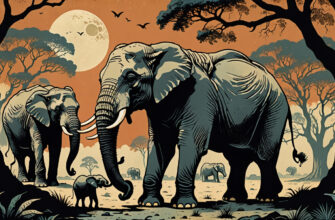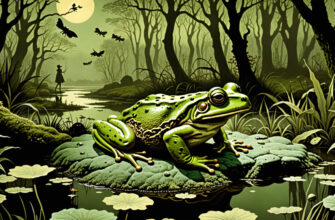Ever had a dream where one black sheep is just standing there—staring at you, or maybe being ignored by the rest of the flock? It hits different. These dreams don’t just show up out of nowhere; they tend to land during moments when your sense of belonging feels shaky, or when you feel like you’re either the misunderstood one or the one watching someone else be misunderstood.
Black sheep dreams often carry an emotional charge that lingers even after you wake up. Maybe there was shame bubbling underneath, or a strange comfort in that outsider role. Maybe the black sheep looked scared, or maybe it was unfazed—at peace in its difference. That vibe matters.
If you’re asking yourself what a black sheep dream could mean, start by asking how it made you feel. And how did the sheep feel? Were you trying to protect it—or avoid it? Whether it stood out on purpose or got cast out unwillingly, that detail’s not small—it might hold the whole meaning. Now let’s break that down.
- The Immediate Emotional Tone In The Dream
- Common Themes Behind Black Sheep Dream Experiences
- The Archetype Of The Black Sheep Across Cultures And Family Systems
- Psychological Meanings: Internalized Guilt, Rejection, Or Authenticity Coming Online
- Spiritual Interpretations: Shadow Work, Karmic Roles, Ancestral Echoes
- Dream Themes with the Black Sheep: How They’re Trying to Speak to You
- Dreaming you are the black sheep
- Dreaming of a family member or friend as the black sheep
- Dream settings and emotional atmosphere
- Nightmares and subconscious fears
- Dream Healing: What the Black Sheep Shows About Your Growth
- Signs the dream is calling you into healing, not punishment
- From misfit to mirror: reclaiming the black sheep as sacred
The Immediate Emotional Tone In The Dream
A black sheep dream can feel anything from weirdly comforting to completely gutting. And that emotional weight gives you a clue about where it’s pointing in your life. Some common dream moods:
- Fear: Feeling exposed, judged, or cast out.
- Comfort: Finally finding peace in your difference. Could even feel like relief.
- Confrontation: Unspoken tensions rising, typically with family or your chosen crew.
- Distance: Watching the black sheep from afar—avoiding something part of yourself?
Noticing whether the black sheep seemed aggressive, passive, proud, or shameful matters too. Was it pushing boundaries—or just sitting in the background, forgotten? Its energy mirrors your own inner narrative.
Sometimes the sheep represents you. Sometimes, it’s someone close. Either way, the dream is rarely random—it’s hitting on the sore spots tied to difference, rejection, and acceptance.
Common Themes Behind Black Sheep Dream Experiences
Dreams like these often revolve around the ache of not fitting in—or resisting the pressure to. Common storylines include:
- Exclusion: You (or someone else) getting pushed out of the group, ignored at the table, or marked as “not one of us.”
- Misunderstanding: Feeling like no matter what’s said or done, people just “don’t get it.”
- Emotional rebellion: A quiet (or not-so-quiet) protest against doing what’s expected. Refusing to shrink into what’s acceptable.
The black sheep can show up in these dreams as either a role that’s chosen—or one that’s pushed onto you. That matters. Were you proudly walking away, or were you being left behind? Feeling empowered feels wildly different from feeling abandoned, even if the image looks the same.
Sometimes, the “black sheep” label becomes armor—a way to reclaim your identity. Other times, it still stings. Dreaming about it means your subconscious is still working that out.
The Archetype Of The Black Sheep Across Cultures And Family Systems
Culturally, the black sheep is the one who breaks rank. The rule-breaker. The disappointment. But also the one who questions everything. In family dynamics, they often carry the truths no one wants to say out loud—that unspoken trauma, the elephant in the room, the parts nobody wants to claim.
There’s also a survival element to rebellion. Choosing to not conform might be the only way someone avoids repeating toxic patterns. In this way, being the outcast becomes a necessity—not just defiance.
Some cultures see black sheep as marking shame. Others honor the one who walks away from the “herd” as someone sacred—carrying knowledge, intuition, or generational wounds meant to be cleared. Depends who’s telling the story… and how deep those stories go in your own lineage.
Psychological Meanings: Internalized Guilt, Rejection, Or Authenticity Coming Online
If you regularly question whether you’re too much—or not enough—this dream might go right for those raw spots. The black sheep is often the part of you that:
- Refuses to fake it anymore.
- Feels isolated even in a room full of people.
- Wants to fit in but knows it’d cost too much.
And let’s talk guilt. These dreams can show up when you’re tired of carrying other people’s expectations, but still feel bad for letting them down. They can also come when you’re stepping into your most honest self—and it’s terrifying.
The dream’s not just a repeat of family drama or identity crisis. It’s your psyche asking: “Can I be this version of me—and still feel safe?” That’s a big ask. And it’s why the black sheep might show up as a mirror before it ever shows up as a villain or hero.
Spiritual Interpretations: Shadow Work, Karmic Roles, Ancestral Echoes
There’s a deeper current to this dream that doesn’t get talked about enough. Black sheep can represent parts of the soul that have been exiled—not just in this life, but maybe over many.
- Shadow work: The dream nudges you to look at what you’ve pushed away—your anger, grief, desire, impulses.
- Karmic roles: Sometimes, a soul agrees to carry the role of truth-teller, cycle-breaker, or chaos-bringer to shift old energy.
- Ancestral echoes: You could be facing a story of separation, rejection, or scapegoating that didn’t begin with you—but wants to end with you.
In some spiritual dream maps, the black sheep isn’t the problem. It’s the initiator. The one who wakes up. The one who reclaims power—on purpose, even if it means walking alone.
That’s not punishment. It might be your soul’s way of saying, “You’re not here to repeat. You’re here to release.”
Dream Themes with the Black Sheep: How They’re Trying to Speak to You
Ever wake up from a dream where you’re the odd one out—staring across a dinner table full of blank stares, wandering through a lonely field, or trying to be heard over a crowd that just refuses to listen? If the black sheep shows up in your sleep, your subconscious isn’t just being dramatic. It’s mapping something real: your place in the system, your resistance, your transformation.
Dreaming you are the black sheep
This kind of dream doesn’t always feel like a win—it can come with a heavy dose of being left out or walking around with the constant feeling of “too much” or “not enough.” It shows up when you’re in real-life friction:
- Feeling cast aside by family or friends
- Sticking firm to new boundaries that make others uncomfortable
- Changing your identity in ways that threaten “the way it’s always been”
Sometimes you’re the rebel, sometimes the exile. These dreams might remind you that isolation isn’t always punishment—it might be protection or clarity. If it felt brave rather than bruising, maybe you’re stepping into your own path, not being forced off theirs.
Dreaming of a family member or friend as the black sheep
Seeing someone else in that outsider role? There’s usually a mirror here. Maybe it’s about shame you project onto them—things you secretly fear about yourself. Or maybe the dream is squeezing you between loyalty and truth, asking:
Are you protecting the peace or pretending for comfort?
This kind of dream might spotlight how you’ve judged someone for doing what you didn’t have the guts to do: walk away from what wasn’t serving them.
Dream settings and emotional atmosphere
Black sheep dreams often bring surreal—but oddly specific—settings. Each comes loaded with hidden meaning:
- Isolated pastures: A desire for peace or symbol of excommunication
- Tense family dinners: Conflict hidden under politeness
- Chaotic barns: Inner emotional messes made public
These dreamscapes get under your skin. They turn feelings into landscapes—loneliness as a snow-covered hill, resentment as spilled wine on a white tablecloth. Look at the backdrop and vibe of the dream: was there dread, pride, jealousy, liberation? That mood is a clue trying to shout over your internal noise.
Nightmares and subconscious fears
When the black sheep isn’t just misunderstood but feared—or monstrous—your brain’s doing shadow work in real time. This dream might look like:
- A black sheep attacking family members
- Becoming a ghost or rebel you can’t control
- Leaving the flock only to face danger alone
The real question: who’s scared? You—or the people watching you change? Fear in these dreams can reflect guilt (Am I betraying them?) or threat (Will I lose them if I keep growing?). But it might also point to power—what happens when you stop asking for permission?
Dream Healing: What the Black Sheep Shows About Your Growth
Signs the dream is calling you into healing, not punishment
So what if the dream wasn’t trying to punish you? Some black sheep dreams hold a quiet truth bomb: that shame isn’t the end, it’s just the flashlight pointing to hidden truths. When you dream of standing apart—but still standing strong—it’s your psyche highlighting:
- A moment where you finally stopped performing
- A need to tell your story, uncensored
- That gut feeling that you were never “wrong,” just early
That ache in the dream—of misplaced love, of silence, of being othered—could just be growing pains. Not everything that hurts is here to harm.
From misfit to mirror: reclaiming the black sheep as sacred
Here’s the shift: you’re not broken, you’re breaking cycles. The black sheep holds the mirror that nobody else in the family wants to look into. Maybe your role wasn’t to fit in—it was to show what the group was too scared to change.
And still: you don’t have to wear the outsider label like a punishment jumpsuit. You can carry the wisdom of survival without letting it shape every room you walk into. The black sheep isn’t the villain—it’s the one awake.
